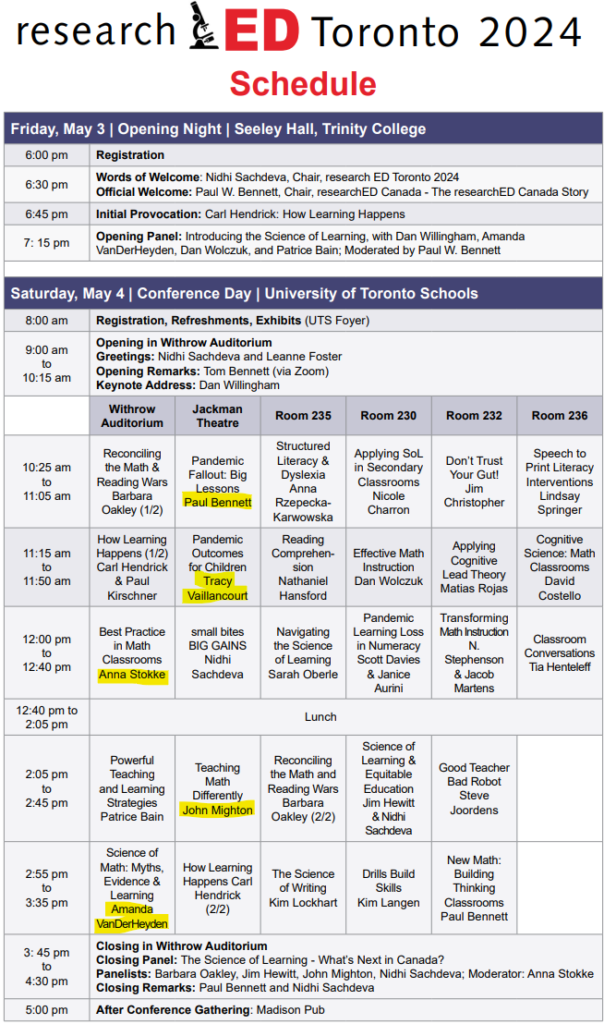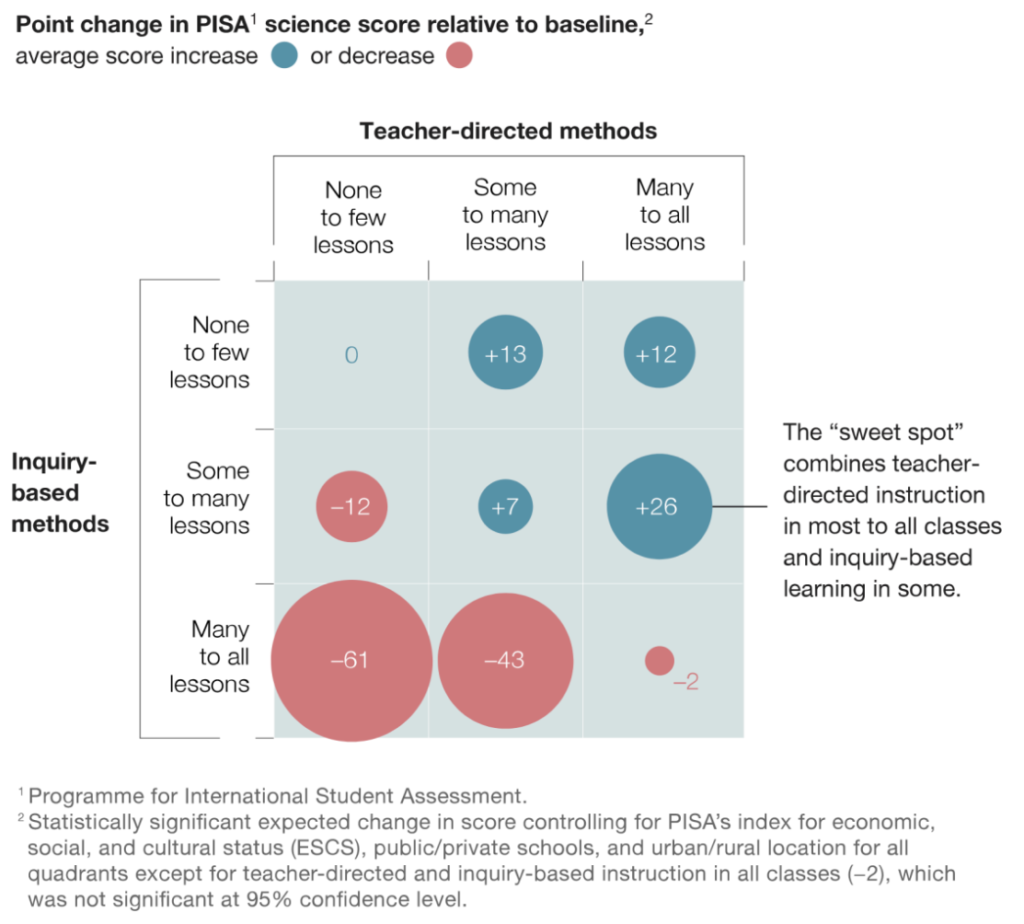I first heard about ResearchEd through Anna Stokke’s Chalk & Talk podcast. When I saw that the conference was coming to Toronto, I immediately booked my train ticket from Ottawa. I didn’t care if my school board would reimburse me. The speaker lineup was just too good. It was impossible to pick which session to attend. I highlighted my picks in the image below.
It turned out the OAME annual conference was held on the same weekend. After looking at both conference programs, I’m glad I attended ResearchEd at my own expense. It was surreal to meet John Mighton, to share nachos with Barbara Oakley and Dan Wolczuk, start off Saturday over coffee with Anna Stokke and Amanda VanDerHeyden, and have some casual lunch conversations with Daniel T. Willingham. It’s not every day you get to break bread with your intellectual heroes. The entire ResearchEd community was extremely welcoming, humble, and generous. I couldn’t have asked for a better experience.
It was refreshing to meet people who unapologetically dedicate their lives to the art of teaching. Below are my takeaways. Enjoy!

Daniel T. Willingham – Why Don’t Students Like School?
- Dan’s humility was inspiring. I was fortunate enough to share a table with him for lunch on Saturday. He asked me questions and was interested in my answers. This is rare for someone of his status.
- “If teaching would be strictly restricted to evidence-based practices, then your teaching day would end at 9:15 AM.” We don’t know that much with absolute certainty.
- Sticking with a belief system that “works” makes sense. Since education doesn’t have quality data and assessments, people can hold their views and teach however they see fit.
- Why should we believe you and not other math experts?
- Randomized-controlled trials
- At least trying to be aligned with evidence
- Direct instruction is boring, so what is the incentive to promote it? It doesn’t sell well.
Paul W. Bennett – EduChatter
- A future-proof curriculum is words and numbers (literacy and numeracy).
- Math should be taught year-round and not on a semester basis.
- Chronic absenteeism is defined as 10% of school days in Canada. It’s on the rise. Learning loss from the pandemic leads to behavioural issues and absenteeism.
Tracy Vaillancourt – Ottawa University
- Eating disorders are the deadliest mental disorders.
- Physical activity is the best treatment for mental health in teens.
- Start greeting kids at the door. Mattering matters.
Anna Stokke – Chalk & Talk
Learning requires a change in long term memory.
Kirschner, Sweller and Clark, 2006
- Practice, practice, practice.
- Standard algorithms are useful.
- Building Thinking Classrooms is suspect and has little evidence supporting it.
- Block till mastery, then interleave and spiral in spaced repetition.
- Anna asked the audience what they thought when answering questions at the end of her talk. As a group, the ResearchEd community has an astounding amount of expertise.
For all content areas, practice allows students to achieve automaticity of basic skills—the fast, accurate, and effortless processing of content information—which frees up working memory for more complex aspects of problem-solving.
The Final Report of the National Mathematics Advisory Panel
John Mighton – Jump Math & All Things Being Equal
- The 85% rule:
- “optimal learning is achieved when learners engage with tasks at which they have an 85% accuracy rate. Training at this level dramatically improves the rate of learning.”
- This is roughly the zone of proximal development.
- Move from concrete to abstract relatively quickly. The goal is to understand the abstract principles and not get caught up in the specific details (Kaminsky 2008).
- Strip words from math problems. It decreases engagement by leading to lower success rates. You can eventually scaffold your way to complex word problems. Most real-world situations don’t involve a ton of words on a page. Instead, authentic math opportunities occur visually.
- Does discovery-based instruction enhance learning? Nah
- Teaching students about Growth Mindset has little effect. Provide the students evidence of their efficacy through scaffolding and the zone of proximal development (85% rule) forces them to witness a growth mindset.
- District-wide resources should be piloted and improved based on student and teacher feedback.
- JUMP Math randomized control trials don’t convince school districts.
- JUMP Toronto case-study
- Why aren’t we seeing higher achievement scores on standardized tests?
The normal curve is a distribution most appropriate to chance and random activity. Education is a purposeful activity, and we seek to have students learn what we would teach. Therefore, if we are effective, the distribution of grades will be anything but a normal curve.
Benjamin Bloom
Amanda VanderHeyden – Science of Math & Spring Math
- Assessing fluency is better than accuracy. Fluency implies accuracy.
- Instructional Hierarchy (see image below)
- The frequency of intervention matters when equating duration.
- It’s an empowering mindset to believe that students never fail the intervention. Instead, the intervention failed the student. If a drug doesn’t work for a patient, we don’t say that the patient failed the drug. We try new drugs until we find something that works.

Nidhi Sachdeva – OISE – Slides
Explicit instruction is inclusive instruction.
Three whole-class instructional strategies have been shown to reduce inequities:
- Explicit Instruction
- Retrieval Practice
- Formative Assessment & Feedback


Jim Hewit – OISE
- Top-down changes rarely work. We need to rely upon the ripple effect of planting seeds. Patience and perseverance are key.
- What you get from Teacher’s College is 1000 ideas with no structure. You need a valid teaching and learning theory to hang these ideas onto the lattice of thought.
Barbara Oakley – Learning How to Learn
- “Moving a university is like moving a cemetery, you can’t expect help from the inhabitants.”
- Almost no educational research gets replicated (source & source).
Dan Wolczuk – University of Waterloo
- Grade inflation is a problem. How should universities recruit students who will excel in their demanding programs?
- What is the use of in-class polls if you don’t modify instructions? Should you reteach something if 70% of students get it right?
- Toast Masters, acting, and public speaking courses should be part of teacher training.
Evidence-Informed Instruction
- The science of learning literature is robust. Principles such as retrieval practice, spaced repetition, interleaving, and working memory are well established. The implementation of those principles as concrete interventions in the classroom is much less clear-cut. That said, the practices below are time-tested common sense and evidence-informed teaching practices:
- Rosenshine’s Principles of Instruction.
- Explicit instruction. I do, We do. You do.
- Scaffolding (High success rate to keep them in the zone ~ 85% ish)
- Retrieval practice
- Formative assessment + feedback
- We need a valid assessment of curriculum standards (targets). Once we have that, we can design our instruction with this in mind.
- Look at the curriculum to list the big ideas of a specific course.
- Design the final exam to test those big ideas.
- Design a list of summative evaluations throughout the course to measure the standards.
- Design and sequence instruction to help students master the standards.
Resources
- How Learning Happens – Paul Kirschner & Carl Hendrick
- Why Don’t Students Like School? – Daniel T. Willingham
- All Things Being Equal – John Mighton
- Learning How to Learn – Barbara Oakley
- Outsmart Your Brain – Daniel T. Willingham
- Science of Math
- Ontaria Institute for Studies in education (OISE)
- The Spirit of Math
- Times Tables Rock Stars
- Rosenshine’s Principles of Instruction
- Chalk and Talk
- How I Wish I Had Taught Maths – Craig Barton
- Marzano Standards-based Grading
- Think Again – Adam Grant
- Trends in International Mathematics and Science Study (TIMSS)
- Program for International Student Assessment (PISA)
- EQAO provincial test




